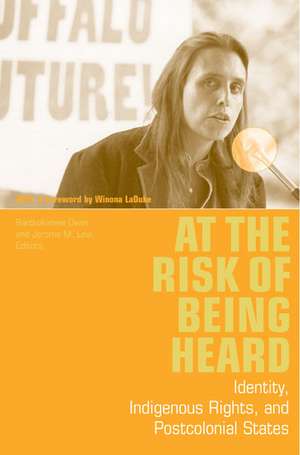At the Risk of Being Heard: Identity, Indigenous Rights, and Postcolonial States
Editat de Bartholomew Crispin Dean, Jerome Meyer Levien Limba Engleză Paperback – 10 iun 2003
Leading experts in the analysis of ethnicity and indigenous rights explore the questions of why and how the circumstances of indigenous peoples are improving in some places of the world, while their human rights continue to be abused in others. Drawing on case studies from Asia, Africa, Australia, and the Americas, chapters explore how political organization, natural resource management, economic development, and conflicting definitions over cultural, linguistic, religious, and territorial identity have informed indigenous strategies for empowerment.
Combining rich ethnographic descriptions with clear theoretical analyses, At the Risk of Being Heard considers the paradoxical challenges and opportunities confronting indigenous peoples at the dawn of the twenty-first century. In the face of state-sanctioned violence, indigenous peoples encounter considerable risks when asserting their rights, especially to self-determination. Yet, if they remain silent or absent from new arenas of power, hiding in marginalized homelands or cultural practices, they risk being invisible to those allies that would aid them in their struggles for survival.
At the Risk of Being Heard offers needed insights for individuals working on issues of governance, sustainable development, resource management, globalization, and indigenous affairs. It will undoubtedly appeal to undergraduate and graduate students in anthropology, sociology, history, political science, peace studies, and to those students in courses that explore relationships among postcolonial states, indigenous peoples, and human rights.
Bartholomew Dean is Assistant Professor of Anthropology, University of Kansas. Jerome M. Levi is Associate Professor of Anthropology, Carleton College.
Combining rich ethnographic descriptions with clear theoretical analyses, At the Risk of Being Heard considers the paradoxical challenges and opportunities confronting indigenous peoples at the dawn of the twenty-first century. In the face of state-sanctioned violence, indigenous peoples encounter considerable risks when asserting their rights, especially to self-determination. Yet, if they remain silent or absent from new arenas of power, hiding in marginalized homelands or cultural practices, they risk being invisible to those allies that would aid them in their struggles for survival.
At the Risk of Being Heard offers needed insights for individuals working on issues of governance, sustainable development, resource management, globalization, and indigenous affairs. It will undoubtedly appeal to undergraduate and graduate students in anthropology, sociology, history, political science, peace studies, and to those students in courses that explore relationships among postcolonial states, indigenous peoples, and human rights.
Bartholomew Dean is Assistant Professor of Anthropology, University of Kansas. Jerome M. Levi is Associate Professor of Anthropology, Carleton College.
Preț: 245.24 lei
Nou
Puncte Express: 368
Preț estimativ în valută:
46.93€ • 48.82$ • 38.75£
46.93€ • 48.82$ • 38.75£
Carte indisponibilă temporar
Doresc să fiu notificat când acest titlu va fi disponibil:
Se trimite...
Preluare comenzi: 021 569.72.76
Specificații
ISBN-13: 9780472067367
ISBN-10: 0472067362
Pagini: 356
Ilustrații: 11 B&W photographs, 10 maps
Dimensiuni: 152 x 229 x 23 mm
Greutate: 0.51 kg
Ediția:New.
Editura: UNIVERSITY OF MICHIGAN PRESS
Colecția University of Michigan Press
ISBN-10: 0472067362
Pagini: 356
Ilustrații: 11 B&W photographs, 10 maps
Dimensiuni: 152 x 229 x 23 mm
Greutate: 0.51 kg
Ediția:New.
Editura: UNIVERSITY OF MICHIGAN PRESS
Colecția University of Michigan Press
Notă biografică
Bartholomew Dean is Assistant Professor of Anthropology, University of Kansas.
Jerome M. Levi is Associate Professor of Anthropology, Carleton College.
Jerome M. Levi is Associate Professor of Anthropology, Carleton College.
Descriere
An analysis of indigenous rights and the challenges confronting indigenous peoples in the twenty-first century
